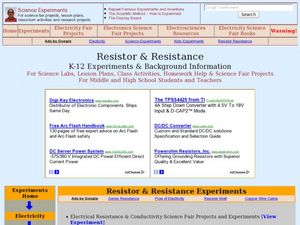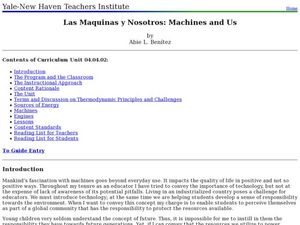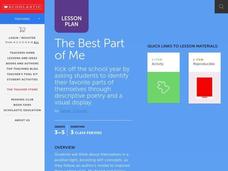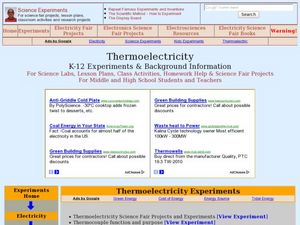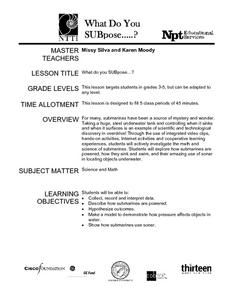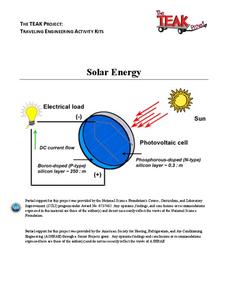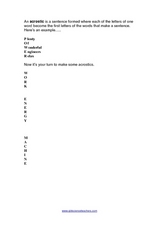Curated OER
Digital Communication
In this physics worksheet, students differentiate the three telegraph circuits. They complete 10 short answer questions about digital communication.
Curated OER
High Reliability Circuits
For this physics circuits worksheet, students calculate and write short answers to 9 questions about high reliability circuits. They solve and draw schematic diagrams.
Curated OER
Stepper Motor
Students compare a stepper motor from a traditional motor. For this physics lesson, students summarize how it works. They build their own stepper motor and explore its uses.
Curated OER
Resistor and Resistance
High schoolers explore electrical resistance through various experiments. For this physics lesson, students calculate resistance using a mathematical formula. They explain how colors identify the resistance value of a resistor.
Curated OER
Magnets
Students complete a series of experiments using magnets. In this physical science and magnetism lesson, students first predict and test the magnetic properties of various objects, then students determine if the size of a magnet impacts...
Curated OER
Las Maquinas y Nosotros: Machines and Us
Second graders explain the relationship between energy and work. In this technology lesson plan, 2nd graders describe the different uses of machines in their everyday lives. They record observations and data in their science journal.
Curated OER
Best Part of Me
Students determine a positive physical feature of themselves. They participate in an online writer's workshop and write descriptive poem about their favorite feature. They create a display of poetry and pictures.
Curated OER
The Ups and Downs of Technology
Students create a visual timeline of skyscrapers built in the past 20 years. In this physical science lesson, students research important facts about the building. They discuss the challenges architects face when building skyscrapers.
Curated OER
Simple Harmonic Motion with Dr. DAQ
Young scholars study the work and accomplishment of Galileo. In this physics lesson, students calculate the period of a pendulum's using a mathematical equation. They explain the different factors affecting its period.
Curated OER
Rechargeable Batteries
Students explore how rechargeable batteries work by conducting a series of experiments. In this physics lesson, students discuss the benefits of using rechargeable batteries over disposable ones. They build their own battery charger...
Curated OER
Thermoelectricity
High schoolers conduct a series of experiments on thermoelectricity. In this physics lesson, students investigate how thermocouple works. They determine the voltage generated when different conductive materials are held at different...
Curated OER
Build Your Own Hovercraft
Students construct a hovercraft following specific procedures. In this technology lesson, students explain the physics principles behind hovercraft. They compare and contrast this machine with the aircraft.
Curated OER
Physics: Electricity and Magnetism
Young scholars draw series and parallel electrical circuits. In this electromagnet lesson, students describe how current changes depend on circuit components. Young scholars use an OHT of a series and parallel circuit to predict the path...
Curated OER
Electronic Circuit Design
Learners design circuits to power 3-9 volt devices such as CD players or flashlights. After measuring the voltage and current requirements for the item, they design a loaded voltage-divided circuit to power it. Students work in teams to...
Curated OER
TECH: Geneticist
A brief PowerPoint is used to introduce the class to the field of genetics by explaining the fields of work, the education required, and the job prospects. A trait inventory worksheet is completed by individuals, and then they gather...
Curated OER
What Do You SUBpose?
Submarines are the fous of this math and science instructional activity. In it, learners explore the world of submarines: how they work, and what they are used for. They engage in hands-on activities, watch video clips, and work in...
Texas State Energy Conservation Office
Nuts! Calculating Thermal Efficiency
Oh nuts! Do macadamias or almonds produce more thermal energy? Energy enthusiasts find out with this experiment. The objective is to demonstrate to your class how the chemical energy contained in foods can be converted into useable...
Curated OER
Elements of Physics: Energy And Work
High schoolers examine the difference between potential and kinetic energy. In this energy instructional activity students view a video and apply these energies to real world situations.
Rochester Institute of Technology
Biomechanical Joint
Discuss mechanical advantage and how the human body moves/works. Learners focus on bioengineering, working together to build a functioning mechanical arm. Additionally, they analyze an air muscle, discussing its appropriate use in humans.
Curated OER
The Blossoming of Flower Power
Students explore the reproductive functions of flowers by participating in a flower dissection lab.
Rochester Institute of Technology
Solar Energy
Warm up to the idea of solar energy. A lesson plan includes three activities that challenge scholars to apply knowledge in new ways. First, they learn to run an alarm clock without a battery by using solar energy. Next, they complete an...
Curated OER
Making Acrostics
In this making acrostics activity, 8th graders read the definition of an acrostic, read an example of one and write 3 acrostics using the words work, energy and machine.
Curated OER
TE Activity: Pulley'ing Your Own Weight
Young scholars experiment with common objects such as spools, string and soap to determine how pulleys make it easier to move large objects. They look at the difference between fixed and movable pulleys. They examine the many uses...
Curated OER
Spark of Imagination
Young scholars consider the power of physics. In this current events lesson, students listen to a lecture that explores the power garnered by iPod batteries and how they work.





